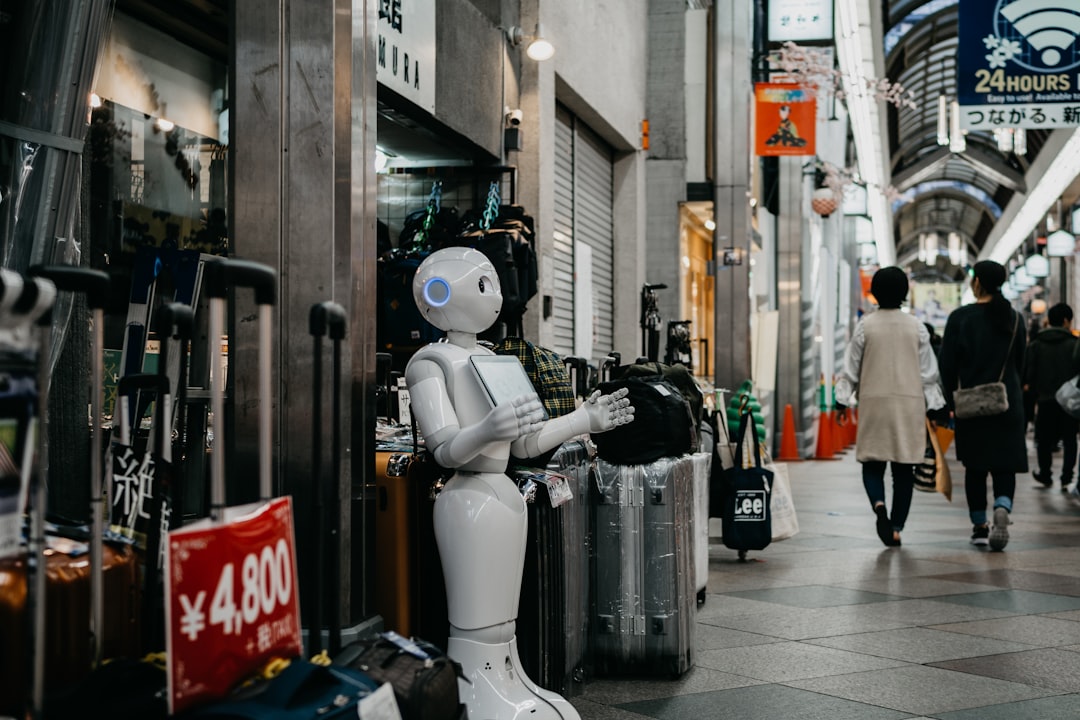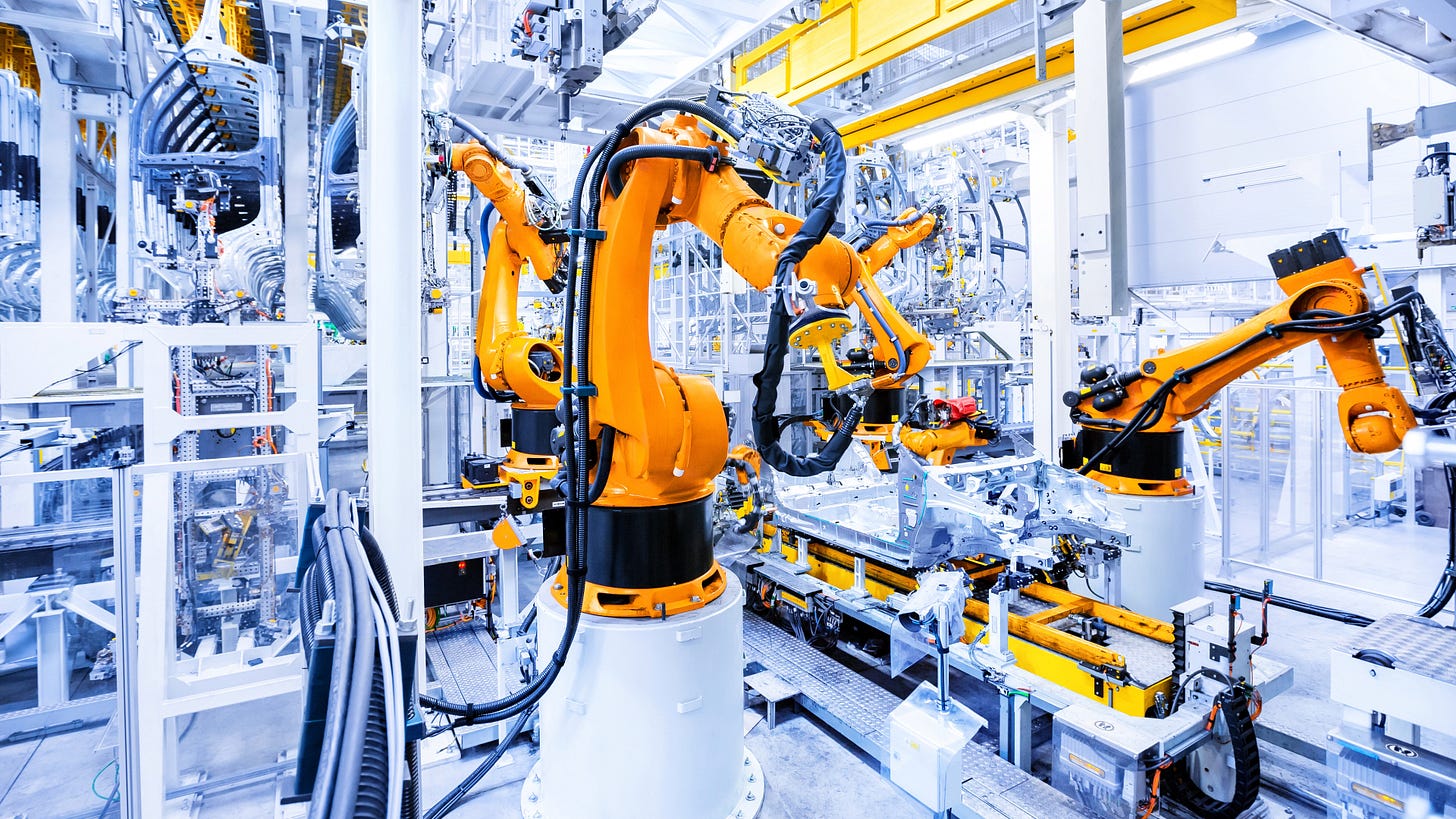🤖How Artificial Intelligence is Revolutionizing Industries
How AI is Disrupting Industries and Taking Productivity to the Next Level
Hi, I’m Wajid Khan. I am trying to explain computer stuff in a simple and engaging manner, so that even non-techies can easily understand, and delivered to your inbox weekly. Join me on an under-the-hood tech journey.
Ready to join the future? The technology we have today is rapidly changing the way we do things. From automation and self-driving cars, to smart home appliances and artificial intelligence, our lives are becoming more convenient and efficient than ever before.
Artificial Intelligence (AI) is expanding quickly and significantly impacts many different industries. It involves the development of computer systems that can perform tasks that usually require human intelligence, such as learning, problem-solving, and decision-making.
🚨AI is changing the world as we know it. From self-driving cars to personalized shopping experiences, AI is revolutionizing industries across the board.
AI is being used in healthcare to improve patient outcomes and reduce costs. AI in education is expected to grow by 47.5% between 2017 and 2021. Technology is helping overhaul obsolete education methods and is taking learning outside of the confines of four walls.
AI Is Transforming the Healthcare Industry
We've all heard a lot about AI in recent years, but have you stopped to think about just how revolutionary the technology is? AI is drastically changing the way businesses operate, and it's already having a huge impact on the healthcare industry.
One way it's transforming healthcare is through improved medical diagnoses. AI can analyze medical images with greater accuracy than humans, helping doctors make more accurate diagnoses faster. This means quicker and more effective treatment for patients.
AI can also help reduce costs within the healthcare system. By automating routine tasks like record-keeping and data sorting, AI can free up medical personnel to focus on more pressing patient care needs. Additionally, AI-based systems for diagnosis can potentially lower costs by reducing misdiagnosis.
Finally, AI is playing an important role in improving patient care. By using predictive analytics and natural language processing, AI-based systems are able to proactively identify potential issues before they become serious problems and alert medical personnel accordingly. This can help hospitals ensure that patients receive better care in a timely manner.
Overall, artificial intelligence has ushered in a new era of healthcare that promises to make the industry more efficient and effective than ever before.
AI Powers the Transportation Revolution
If you've found yourself in awe of driverless vehicles or automated airplanes, it's AI that has made them possible. In the transportation industry, AI is leading the way in revolutionizing how people get from place to place. It's not just self-driving cars either, there are numerous ways AI is impacting this industry.
Here are some of the most common applications:
Autonomous systems: Autonomous cars and planes are possible due to advances in AI and machine learning. This technology can sense its environment, take decisions and act accordingly with little to no human input. With these revolutionary self-driving vehicles, there is an increased safety opportunity as well as a convenience factor.
Robotics: Automation and robotics have become increasingly popular in production lines, helping manufacturers to speed up production while maintaining precision and accuracy of their product. Robotics also helps with maintenance tasks such as inspecting structures in dangerous environments.
Fleet optimization: Companies such as Uber and Lyft have been able to optimize their operations with AI for better efficiencies including route optimization for delivery trucks or ride sharing services to reduce costs and save time.
These are just a few examples of how artificial intelligence is playing a role in the transportation revolution – enabling us to travel safer, faster and smarter than ever before.
AI Is Accelerating Automation in Manufacturing
You might not know that AI is revolutionizing the manufacturing industry. Artificial Intelligence (AI) is already leading to unprecedented levels of automation, and with more and more automation, comes greater efficiency in the manufacturing business.
Automated Design
Using AI to automate product design speeds up the design process significantly. Algorithms can come up with new designs faster than ever before, delivering high-quality results on short timelines. This means that businesses can create products faster and more efficiently, while still ensuring high quality standards.
Automated Production Processes
AI can also be used to automate production processes, such as robotic assembly line processes. This has the potential to increase efficiency and accuracy in large-scale production lines, as robots are able to work continuously without taking breaks or needing constant monitoring from a human supervisor. Additionally, automated production processes mean fewer workers will be needed to oversee a manufacturing process—which can lead to cost savings for a business.
Overall, Artificial Intelligence is enabling greatly increased levels of automation in the manufacturing industry—enabling faster product design and improved efficiency in production processes—which could lead to increased profits for businesses in this sector.
AI Is Revolutionizing the Customer Experience
You may not know it, but Artificial Intelligence (AI) is transforming the customer experience. AI has the potential to simplify the lives of customers by anticipating their needs and providing them with personalized services based on their data and past interactions.
Automation
One of the main advantages of AI is its ability to automate repetitive tasks. This benefit is especially helpful in customer service, as AI can take over time-consuming tasks like data entry, scheduling appointments, filtering emails and more. By automating these processes, customers will save precious time and receive faster responses to their requests.
Predictive Analytics
AI can also be used for predictive analytics, which uses historical customer data to anticipate future behaviors and provide personalized recommendations accordingly. This allows organizations to stay ahead of potential problems and tailor their communication to each individual customer’s needs in order to create a personalized experience.
Overall, AI has already made significant contributions in improving the customer experience through automation and predictive analytics. By taking over mundane tasks that used to require manual labor, businesses are able to save time and money while focusing on creating an exceptional customer experience.
AI Is Improving Efficiency and Productivity
Did you know that artificial intelligence (AI) is revolutionizing multiple industries? AI has the potential to improve efficiency and productivity, helping businesses to work smarter and better.
Here's how:
AI can be used to automate mundane tasks, freeing up employees' time to focus on more complex and important tasks. For example, AI chatbots can answer customer queries, reducing the need for manual customer service.
AI can also be used to process data quickly and accurately – faster than any human could do manually. This means businesses can access real-time insights and make informed decisions quickly.
AI algorithms are also able to learn from data – all the data that a business collects can be used by AI systems to make predictions about future trends and behaviors, enabling businesses to preempt any risks or opportunities in the market.
All of these benefits of AI lead to increased efficiency and productivity gains – in short, they are essential for businesses today in order to stay competitive in a rapidly changing market landscape.
The Future of AI and Its Impact on Jobs
AI is transforming the way we work and how we compete in the global market. It's important to understand not only how AI is impacting specific industries, but how it will change the way we think about jobs. We're seeing a shift away from traditional roles and towards a new model of job creation.
AI has many applications, from customer service to healthcare, that are rapidly changing the way work gets done. Instead of one person doing a single task, AI enables multiple tasks to be completed by an automated system. This means fewer jobs for humans and more for machines, which can complete tasks faster and more accurately than their human counterparts.
AI is also enabling businesses to automate processes and decisions that were previously thought to require human judgment. This makes them faster, cheaper, and more reliable than ever before - allowing companies to focus on growth and innovation instead of mundane tasks. In addition, AI-driven automation will reduce risk associated with certain lines of business as well as increase customer satisfaction through enhanced customer service capabilities compared with traditional models.
AI will continue to revolutionize the way we work, and while it may lead to job losses in some areas, it will also create new opportunities in others. The key is for us to focus on preparing our workforce for this inevitable future - both through education and training - so that they can take advantage of these opportunities when they arise.
Conclusion
AI has the capacity to revolutionize the way we do business and it’s important to understand its potential and implications for the future. Not only can AI help us to become more efficient and accurate, but it can also help us gain a competitive advantage. As AI advances, it will continue to disrupt the way businesses operate and how people interact with technology. AI is here to stay and it’s up to us to embrace it and use it to create a better future.
Hi, I’m Wajid Khan. I am trying to explain computer stuff in a simple and engaging manner, so that even non-techies can easily understand, and delivered to your inbox weekly.






